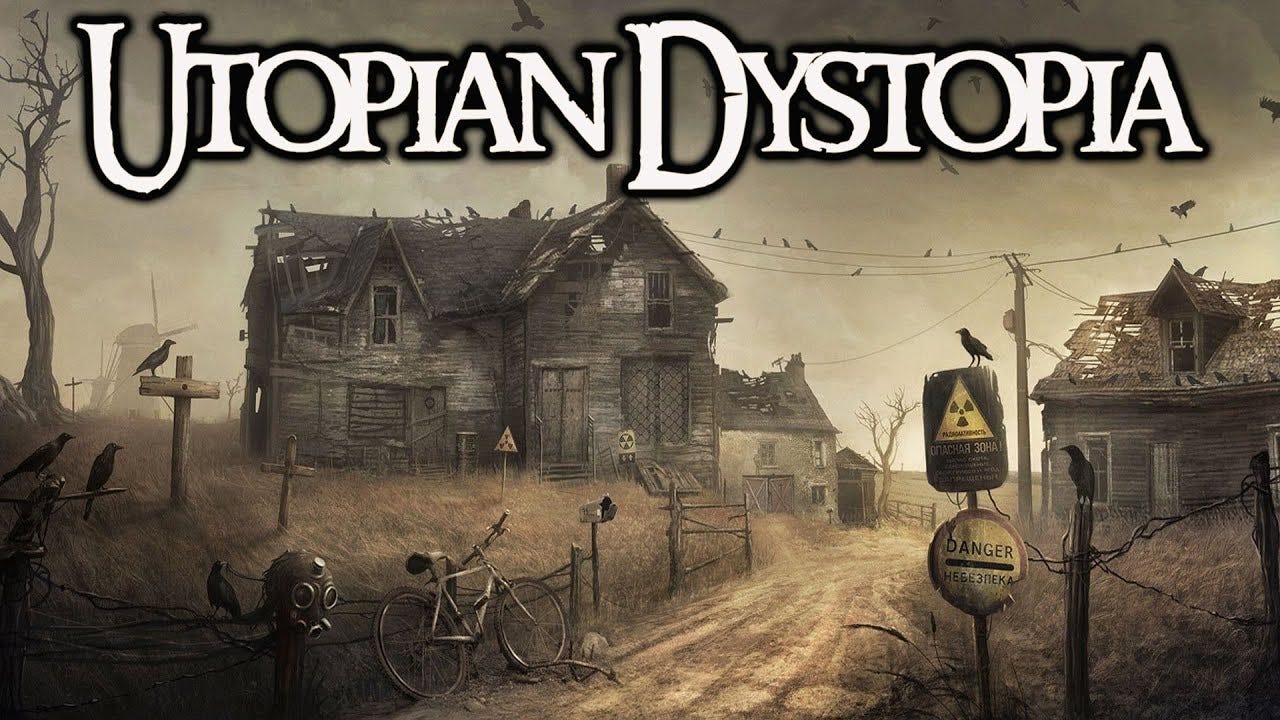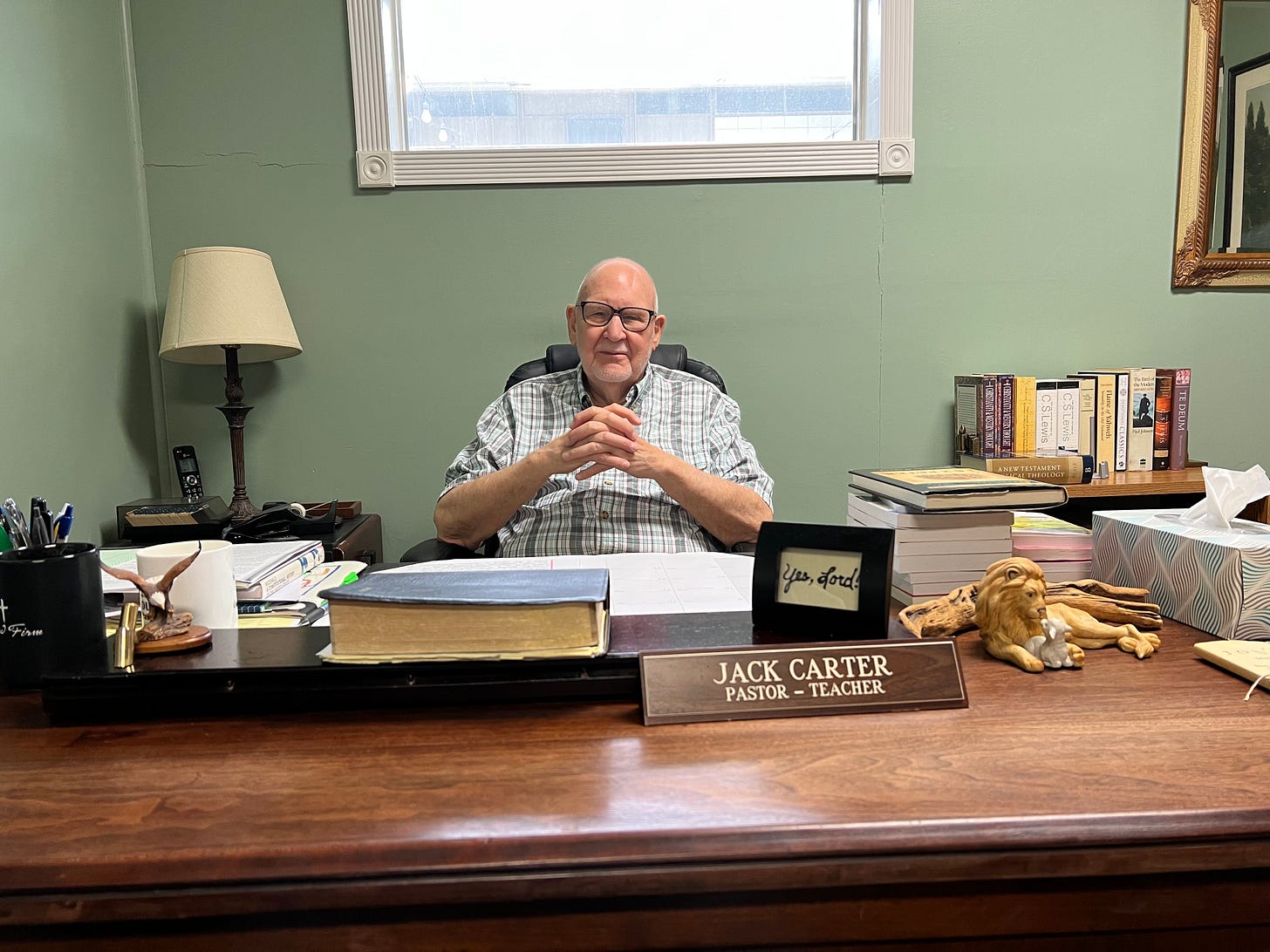Utopia Unbound
Every human attempt to create heaven on earth ends by creating hell. The coming of the heavenly kingdom to earth is an answer to fervent prayer, not the reward for a utopian program.
Dear friends and supporters:
I’m finally home after an 11-day Texas trip and Sharon’s and my 2-day excursion to the California Central Coast to visit long-time friends. We’ll be mostly home until our month-long May speaking tour. It starts May 8–17 at the Ezra Institute’s H. Evan Runner International Academy in northern Georgia (apply here). Runner brings together faculty and delegates from around the world for a ten-day residential training program in reformational Christian worldview. The event will take place at the Fort Mountain Retreat and Conference Center in Chatsworth, GA, and I’ll be speaking numerous times.
In addition, on May 21–24 I’m speaking for Ezra at the Christianity and Culture Colloquium in Brianerd, Minnesota (enroll here).
Please contrast Ezra at bartdevries2012@gmail.com for more information about both events.
Now to the topic at hand.
Introduction
The title of this newsletter is identical to a chapter title in Philip Short’s Pol Pot: Anatomy of a Nightmare.[1] Pol Pot was the infamous leader of the Khmer Rouge that enslaved Cambodia in the mid-70’s and created the horrific Killing Fields, butchering hundreds of thousands of his fellow citizens. But this horror wasn’t the consequence of an intentionally malevolent campaign. The KR were passionate about creating heaven on earth, the most starry-eyed utopians in history, exceeding even the French, Leninist, and Maoist revolutionaries. Pol Pot wished to abolish all individual liberty, religious freedom, property, money, cities, and even private thoughts in one fell swoop. The KR wanted utopia, and they wanted it fast. What they got was dystopia — a national horror that scarred an entire generation from which Cambodia has yet to recover. Their goal wasn’t to murder multitudes; it was to create the perfect society, which required the elimination of multitudes of imperfect people.
Every attempt at utopia — the well-intentioned goal to create the perfect world before Christ’s physical return and the eternal state — likewise ends in dystopia to some degree if allowed to go on long enough. At its core is a profound theological fallacy that drives its entire wreckage program.[2]
Utopia and Human Nature
All utopians exhibit either a theoretical or practical assumption that human nature is malleable and perfectible. The Bible teaches that human nature is fixed: God created man in his image, man is always a creature bound to God’s creational realities, and fallen man cannot abolish the fallen world; only Jesus Christ can do that when he returns at the end of history and ushers in eternity. Man can improve within his created condition (the gospel, in fact, does precisely this), but man cannot escape his created condition.
In radical contrast, utopians believe that man’s nature can be altered, molded, and remolded, usually by the state. For Marxists this meant that man could be shorn of the profit and property motive — he could be transformed to willingly share all the fruit of his labors with his fellow citizens. The fact that political programs based on this assumption have been an unmitigated disaster wherever they’ve been tried hasn’t stopped new generations of utopians from continuing to try, always assuming they can succeed where their forebears have failed.
Sociopolitical Utopia
Utopia as a sociopolitical project is the most common kind. Succeeding the violent utopias of the Khmer Rouge, Soviet Union and Red China in postmodernity are the benevolent Leftist utopias, culturally Marxist regimes that frame laws installing DEI — Diversity, Equity, and Inclusion, language employed in universities and corporations but more widely practiced to assure the enforcement of sexual and racial quotas at war with individual liberty and the evenhanded rule of law. Homophobia, the patriarchy, white supremacy, free markets, and cisgenderism must be smashed, and politics must do the smashing.
Leftist utopia is the society in which all people, views, and practices are equally celebrated, except, of course, the society in which they are not equally celebrated. If your quest is utopia, anyone and anything blocking utopia must be bulldozed. Therefore, white straight successful males must be marginalized and, if necessary, persecuted. The fruits of this Leftist utopia will be no less catastrophic, though less violent, than those of Khmer Rouge Cambodia — our sexual chaos, racial hatred, and economic impoverishment.
Ecclesial Utopia
Moreover, the church can be utopian. Well-meaning ecclesial leaders weary of the pathetic state of the church: laxity, coldness, worldliness, ignorance, apostasy, and they aim not merely for reformation (as they should) but for utopia — the tightly knit, well-regulated, self-sacrificial, open-hearted community largely sequestered from worldly evils. The call often goes out to families, usually with small children, to relocate to the Safe Haven, a spiritual citadel within which they can live in unalloyed joy and hope and peace and virtue and victory. The depraved culture can barely touch them, and they’ll live with the spiritually like-minded in a theological and existential earthly Nirvana.
But while they don’t endorse the Leftist schemes of human perfectibility, they seem in practice to forget that sin is an unalterable fact in the pre-consummate world, and when they arrive at the ecclesial utopia, they discover they’ve smuggled in their own sin with them. The lionized leadership, too, suffers from common sin, and in some cases from more pronounced sin than that of their followers, who usually end up suffering at their well-intentioned but spiritually tyrannical hands.
Soon, hard reality sets in: acrimonious divorces, broken friendships, wayward children, financial catastrophes, and more. Ecclesial reformations account for ingrained human sinfulness. Ecclesial utopias always manage to forget. And they pay the price in human wreckage.
Familial Utopia
In some ways the most seductive and painful utopias of all are familial, because our families bring us our greatest joys and heartaches. Our family molds our entire life, and we cannot escape its influence no matter how hard we might try. Parents, particularly Christian parents, long for rock-solid marriages, spiritually robust families, for children that grow to responsible Christian adults. These are not merely godly aspirations, but necessary ones. If parents want less than this, they want less than God requires.
But the fact that he requires it doesn’t mean we can manufacture it. We can and must pray God’s promises and obey his covenant; but we cannot create a formula for unalloyed success. We cannot craft utopian families.
An agonizing desire for parents is godly children. Parents cannot guarantee children’s impeccably wholesome behavior because parents are no less sinners than children. Godly training inclines obedient adult children and parents cling to God’s covenant promises (Proverbs 22:6). But many faithful parents in the Bible reared children that rebelled (Noah, Isaac, Manoah, Josiah). God himself reared children that rebelled (Isaiah 1:2). Creating a godly family environment, while necessary, is not sufficient.
Any Christian family agenda that ignores the depths of human sin in parent as much as child and forgets that the Holy Spirit alone can permanently alter behavior (because he alone can permanently alter the heart) invites dashed hopes and courts heartbreak. Parents cannot create utopia because they cannot reengineer (fallen) human nature.
God alone can do that.
Conclusion
Utopias — secular or Christian — always rise like an irresistible phoenix and always crash like a wave-imperiled sandcastle. What promise they offer and what tragedy they deliver!
Every utopia founders on the ultimate inflexibility of human nature — whether created human nature or fallen human nature, or both. Every human attempt to create heaven on earth ends by creating hell. The coming of the heavenly kingdom to earth is an answer to fervent prayer, not the reward for a utopian program.
Our task amid all designed-for-failure, amusement-park utopias is faith and obedience. God will fulfill his promises of heaven come down to earth in his good time (Revelation 21).
Will you consider a tax-deductible donation to CCL via PayPal or Venmo? Or mail a check to CCL, Box 100, Coulterville, CA 95311. God uses you to keep us going — and expanding.
Personal
In Corpus Christi I preached again at City Church. The pastor emeritus is Jack Carter, founder of CC 50 years ago and my dear friend for 25 years. I’ve been privileged to know many mighty men of God in my lifetime, and he’s one of the mightiest. He’s a man suffused with the Bible, the Spirit, and the Kingdom. He’s one of the nation’s leading Christian educators and launched Annapolis Classical Christian Academy many years ago. Today it is a large, flourishing school with a massive, remarkable campus.
Jack (like my godly father) will be 90 years old later this year. He is a war horse of the Faith, and my life would have been greatly impoverished had I never met him and his faithful wife Kathy.
Yours for the Kingdom, and against utopias,
Founder & President, Center for Cultural Leadership
3D Salvation
Salvation is much bigger than most Christians suppose. Unless we see salvation (as Paul does in Ephesians) in its personal, corporate, and cosmic dimensions, our view will be impoverished.
Listen to the message here.
Living in an Atmosphere of Prayer
Tweet of the week
More great stuff:
The Center for Cultural Leadership site is here.
My Amazon author page (print and digital) is here.
My I-Tunes sermons, lectures and podcasts are here.
You can find my sermons and lectures at my YouTube channel.
Sign up to get my blog updates here.
Here’s my Twitter feed.
If you want to get the free exclusive hard copy publication Christian Culture, please send me a Facebook private message.
The CCL phone number is 831-420-7230.
The mailing address is:
Center for Cultural Leadership
P. O. Box 100
Coulterville, CA 95311
[1] (New York: Henry Holt and Co.), 2004.
[2] See Thomas Molnar, Utopia, the Perennial Heresy (New York: Sheed and Ward, 1967).






Great tweet.
As usual, etymology tells it all. Utopia=no place.
Any thoughts on the strange question of which political projects, if any, are to be considered as the successors of Gnosticism? This has been asserted against both Marxism (which seems compelling and explanatory) and Christian Nationalism (which seems to depend on a strawman version of CN).